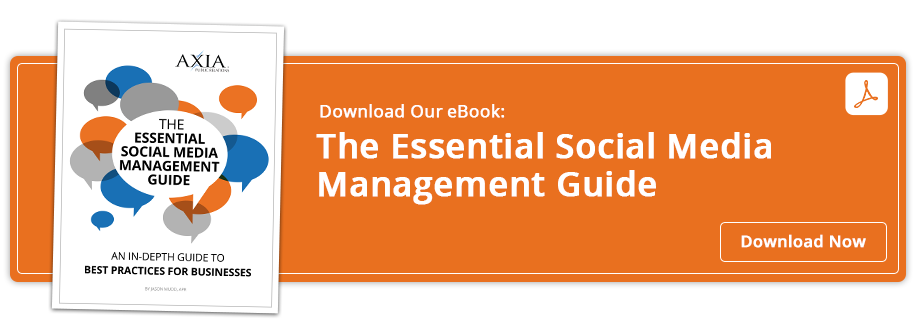You can handle trolls and their negative content
 Regardless of the industry, and no matter the cause it supports, every brand has to deal with different kinds of people on various social media platforms.
Regardless of the industry, and no matter the cause it supports, every brand has to deal with different kinds of people on various social media platforms.
There are the fans; they are your flag bearers and always willing to boost your brand by liking, commenting, and resharing your content. Appreciate them for their love. There are the appraisers who assess your brand and voice their opinions. Tread carefully with these; don’t respond unless it’s utterly necessary.
Audio: Listen to this article.
Then, there is the unhappy audience. They whine about their dissatisfaction with your brand’s products or services. To deal with them, a courteous and unbiased response will do. Quickly point them to any resource that answers their questions or addresses their needs. Don’t continue your conversation with them online; let it continue offline.
Less pleasant than the above are the grumblers and naysayers. These either whine meaninglessly about your brand or outright despise the brand and, possibly, you as a person. In this case, pay them no mind, and let them be.
Another unpleasant breed is the trolls. They intentionally attack your brand by posting entirely unrelated, unruly content to annoy you. They are the focus of this post, and we’ll discuss how to manage their antagonism in a bit.
The reasons behind trolling
It usually comes as a surprise that some people would be committed to unleashing unassociated, provocative content on your brand’s social media pages. However, here are some points explaining why trolls do so:
- Studies have proven that trolls are narcissists, psychopaths, and sadists.
- Their behavior is fostered by the fact that there are no limits to what they can say on social media as opposed to in person. This is popularly referred to as the online disinhibition effect. In the words of boxing legend, Mike Tyson, “Social media made y’all way too comfortable with disrespecting people and not getting punched in the face for it.” We certainly don’t encourage violence at all, but Tyson’s statement makes sense.
- Trolls derive satisfaction from misleading and pointlessly triggering brands’ followers.
- They consider their antics humorous.
Why you shouldn’t let trolls run wild
Social media is everyone’s playground to some extent. The fact that what a person says doesn’t sit right with you doesn’t exactly mean they can’t voice their thoughts.
However, know that what you tolerate is what will continue. Visible signs of trolls’ disgusting actions encourage it to continue. You must protect your audience from these unscrupulous persons.
That’s why you need to stop trolls in their tracks.
The social media platform is your ally; use it well
Social media platforms allow you to report posts and accounts. You can report them for harassment, bullying, discrimination, hate speech, disrespect, and other things.
If possible, you can also employ the profanity filter as much as your brand’s policy permits. This will block words you don’t permit on your brand’s social media page.
Sometimes, a little game of psychology can go a long way. Since trolls are typically looking for cheap attention, use that weakness against them. If your Facebook page’s top fans are trolls, you might want to think twice about that badge.
Dealing with trolls
Whenever you find a particular person trolling your brand on social media, gear up. You’re not helpless at all. There’s the temptation to act emotionally; do not do it. Follow your brand’s guidelines on how to respond to social media comments. It will ensure you’re on track.
It also helps to do a bit of digging on the troll. Find out their location, interests, friends, followers, and those they follow.
Whenever a negative conversation on your brand begins, take it offline as swiftly as possible. Negative comments should be reported, deleted, ignored, or responded to depending on your brand’s guidelines.
Trolls attack whomever they can; make sure your audience doesn’t fall victim to the trolls’ works of mischief. Protect them at all costs.
When your page is in trouble
Sometimes, trolls can take it too far and put your page under fire. You can take some steps to avoid the firestorm.
Firstly, restrict your personal account to strictly your friends. Trolls are unpredictable and might want to attack you. You might also want to reassess your profile picture. The goal is to eliminate every opportunity trolls might have to poke fun at you.
It might help to pump the brakes for a minute. Let your page rest a bit. During this period, it’d be smart to ruminate on your future posts, as well as what can go wrong with them. Trolls have an uncanny ability to turn the most precious posts into moments of disaster.
Additionally, keep in mind that if your brand is doing well, trolls are almost inevitable. Just make sure you don’t get into a battle with the trolls; that’s what they want, but they’re not worth your time.
It can take a toll on you; be conscious of that
Dealing with social media trolls can be quite draining and frustrating. You can make lots of blunders when you’re exhausted and under pressure. To avoid burning out, build a reliable team that can help you out. Mind you, the team will need your help too; make sure you give it when required.
Nights, weekends, and other scheduled off-times are for rest. Avoid reading comments or operating the page by yourself at such times.
Dangers of trolls
Trolls can be quite dangerous. Some threats posed by trolls include:
- Spreading inaccuracies to your audience on your page
- Creating a gloomy atmosphere on your page
- Reputation damage if allowed to run unchecked
- Wasting your time
- Weakening your team’s spirits
Tips for dodging trolls’ mischievous activities
Here are some pointers you can employ to prevent trolls from having a field day on your page:
- Use sarcasm and humor with utmost care
- Select what you post
- Not all questions need to be answered
- Don’t post disagreeable topics towards evenings or the weekend
- It helps to turn off comments on outdated posts
- Indicate the level of knowledge at the time of each post
- It might help to use exact dates as opposed to words such as today, tomorrow, etc.
- Give concise but calculated responses
Other tips for dealing with social media trolls
Other subtle tips can help you deal with social media trolls and their negativity.
1. A social media policy
A social media policy helps you deal with trolls. You need to liaise with your company’s legal department to create one if you don’t have it already. When it is ready, publish it on every social media platform, and follow it regularly.
Keep your team informed so they can help out when necessary.
2. Loyal audience
In a war against trolls, you need an army of devoted supporters. Take time to go through positive comments on your page. Like and respond to such comments. Engage with your supporters regularly to show your gratitude.
3. Optimize posts with caution
After posting, you can make changes to the posts. Take it easy with the edits. It might be best to wait a moment after you’ve posted. To make the necessary edits, look out for misspellings and grammatical errors.
Are people set in their ways? What to do?
Constant consumption of certain information leads people to believe it more. If the information supports their beliefs, they’ll believe it all the more while disregarding any conflicting fact. A study finds that false information spreads faster than facts on social media. Some people might be mischievous enough to share such information knowing they’re untrue.
If you’re faced with this challenge, find out why such people prefer these untruths as opposed to what your brand has to say. Take a stand instead of combating theirs. It helps to listen to your audience instead of attempting to hoist your opinions on them.
Put these tips to work to save your brand from the ravaging effects of social media trolls. Read our post on how to deal with negative attention on social media for more insight.
Topics: online public relations, shared media, social media


Comment on This Article